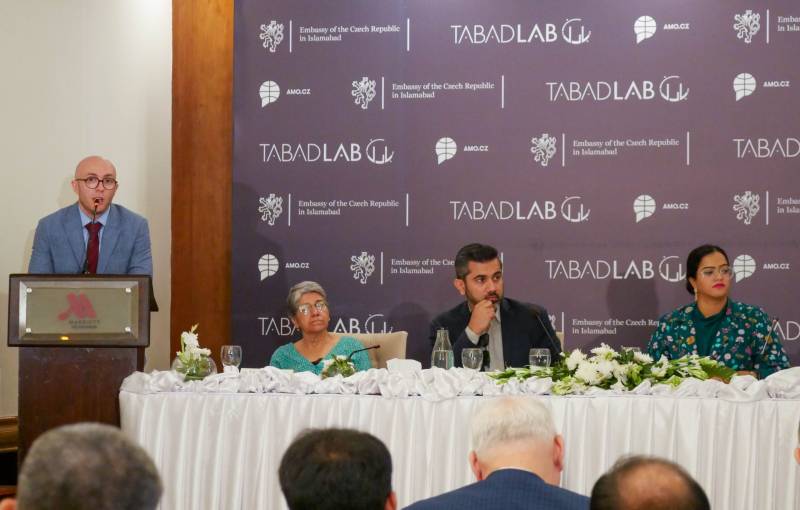
Pakistan has the opportunity to position itself as a major player in the global critical raw materials supply chain, said Michal Čepelka of the Association for International Affairs (AIA) at the latest Tabadlab Policy Roundtable "Global Energy Transition: EU's Resource Quest and Prospects for Pakistan" on Thursday.
The roundtable was hosted by Tabadlab and the AIA in collaboration with the Embassy of the Czech Republic at Marriott Hotel.
Tabadlab hosted this conversation as part of its broader engagement on energy transition and climate change priorities for Pakistan.
The roundtable brought together experts in the fields of extractables, taxation and tariffs, geopolitics and security, and climate change and justice.
With the EU introducing legislation to safeguard its supplies and Pakistan aiming to expand its industry, securing access to these materials is a priority for both, though the mechanisms and foundational reasons differ for both.
In his opening remarks, Mr Čepelka highlighted the surging demand and competition for these critical raw materials internationally.
His presentation was followed by a panel discussion featuring distinguished speakers including former Chairperson of the National Tariff Commission Dr Robina Ather, journalist and sociologist Mavra Bari, and WiE-Pakistan’s Marium Khalid.
The discussion covered forecasted shortages, the EU, US, and China's energy transitions, implications of the EU's 2023 legislation for trade partners like Pakistan, geopolitical challenges in accessing these materials, the legal, social, and environmental repercussions, as well as creating a conducive environment and supportive fiscal policies to promote CRM investments.
Ms Bari highlighted that nature-based solutions must go hand-in-hand with decarbonisation efforts. However, mineral extraction in Khyber Pakhtunkhwa and Balochistan could cause ecological damage. She noted that the climate crisis requires nuanced solutions balancing innovation and sustainability with local participation. She further emphasised that in unlocking its resource potential, Pakistan must find a delicate balance between economic growth and climate justice.
Speaking from the perspective of trade and regulation, Dr Ather mentioned that fiscal policies can encourage the transfer of technology for extraction and processing; however, protectionist policies in this sector may not be in Pakistan’s best interest at the moment.
She echoed Mr Čepelka’s sentiment that the EU legislation presents an excellent opportunity for countries like Pakistan to develop the market and collaboration with Europe could provide the necessary finances and technology to become a secure supply partner for CRM.
Additionally, Ms Khalid highlighted the lack of a comprehensive mining policy in Pakistan and emphasised that developing such a policy is crucial to leveraging the potential of minerals through their various applications.
She stressed on the need to ensure equitable distribution of mining benefits to secure community acceptance.
As Pakistan looks to sustain its economic turnaround and industrial growth, while managing its many climate-induced challenges, collaborative forums like this policy roundtable are key to fostering understanding between the EU and Pakistan so both can achieve their ambitions.
Securing reliable access to these materials through trade partnerships and competitive policies is pivotal for Pakistan's growth.

